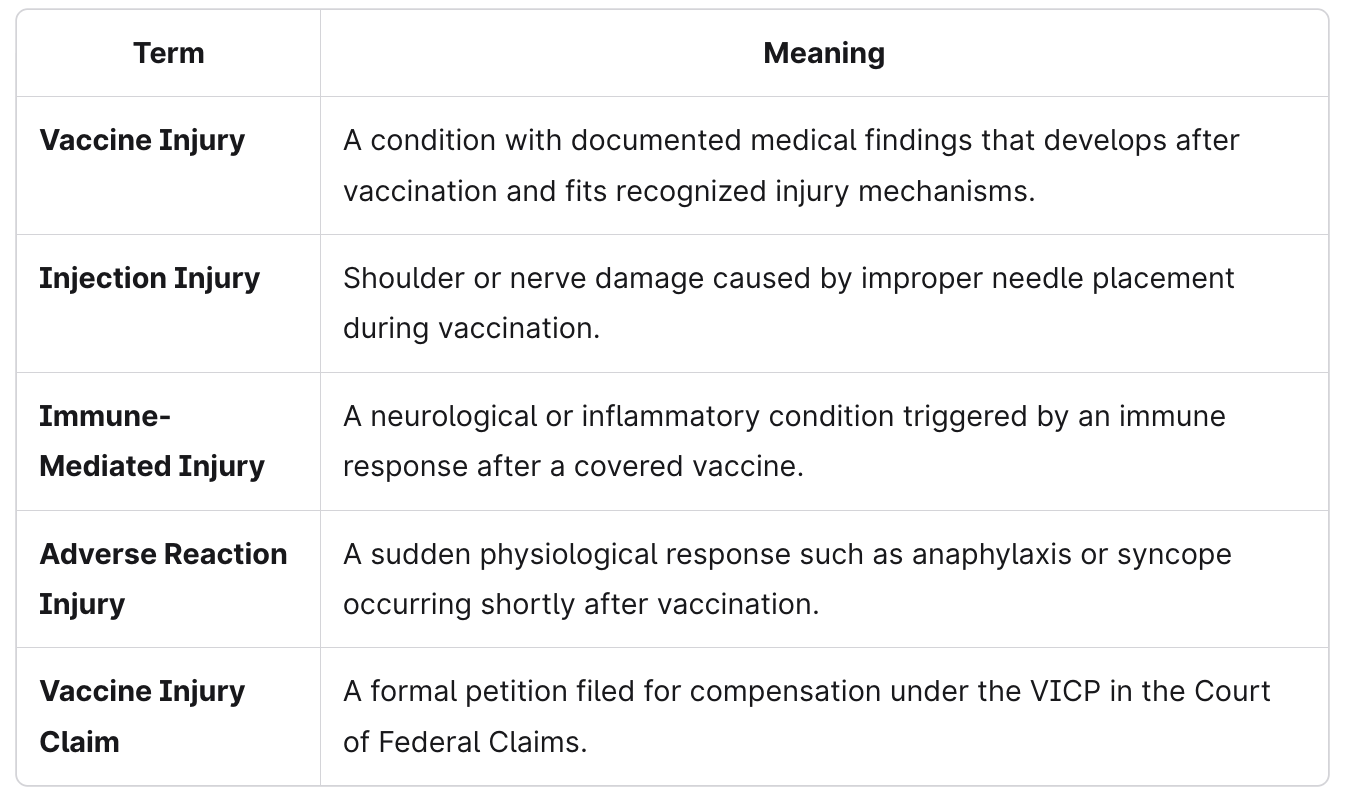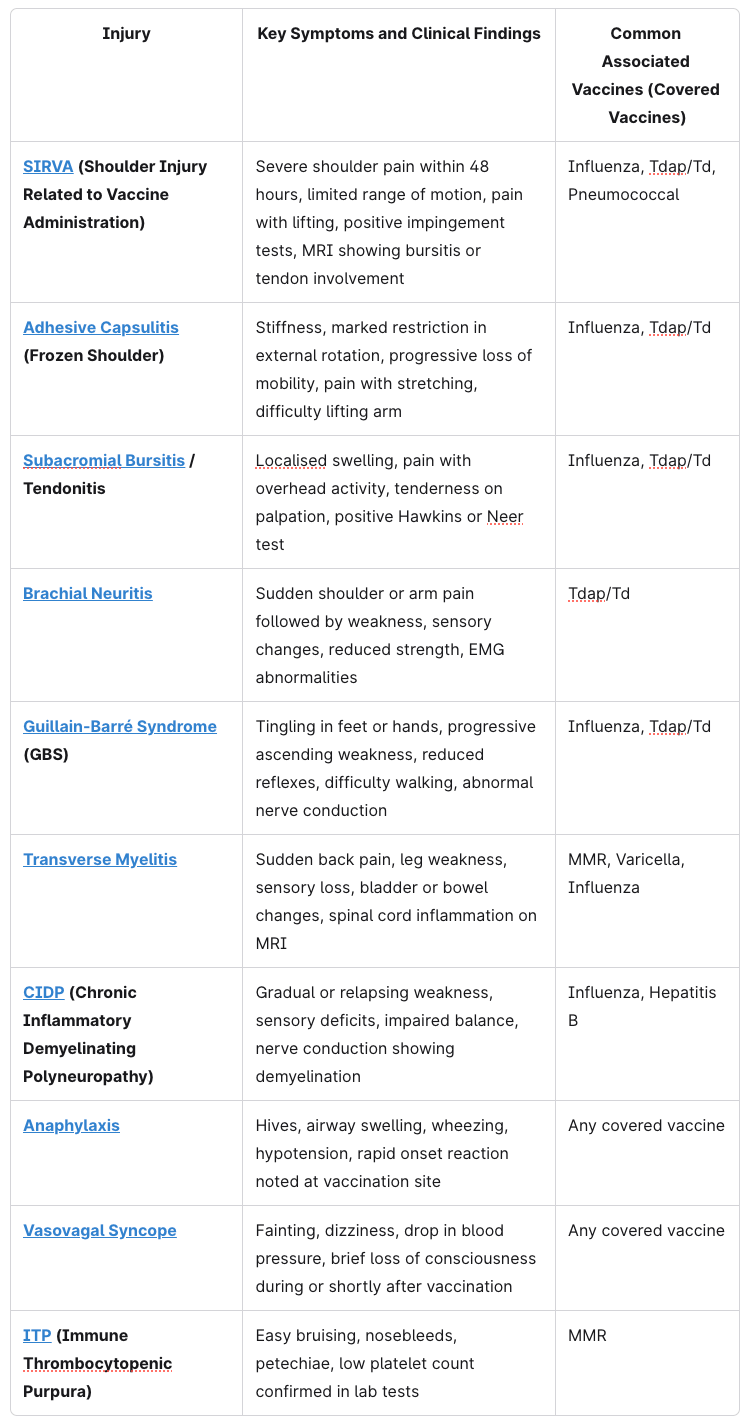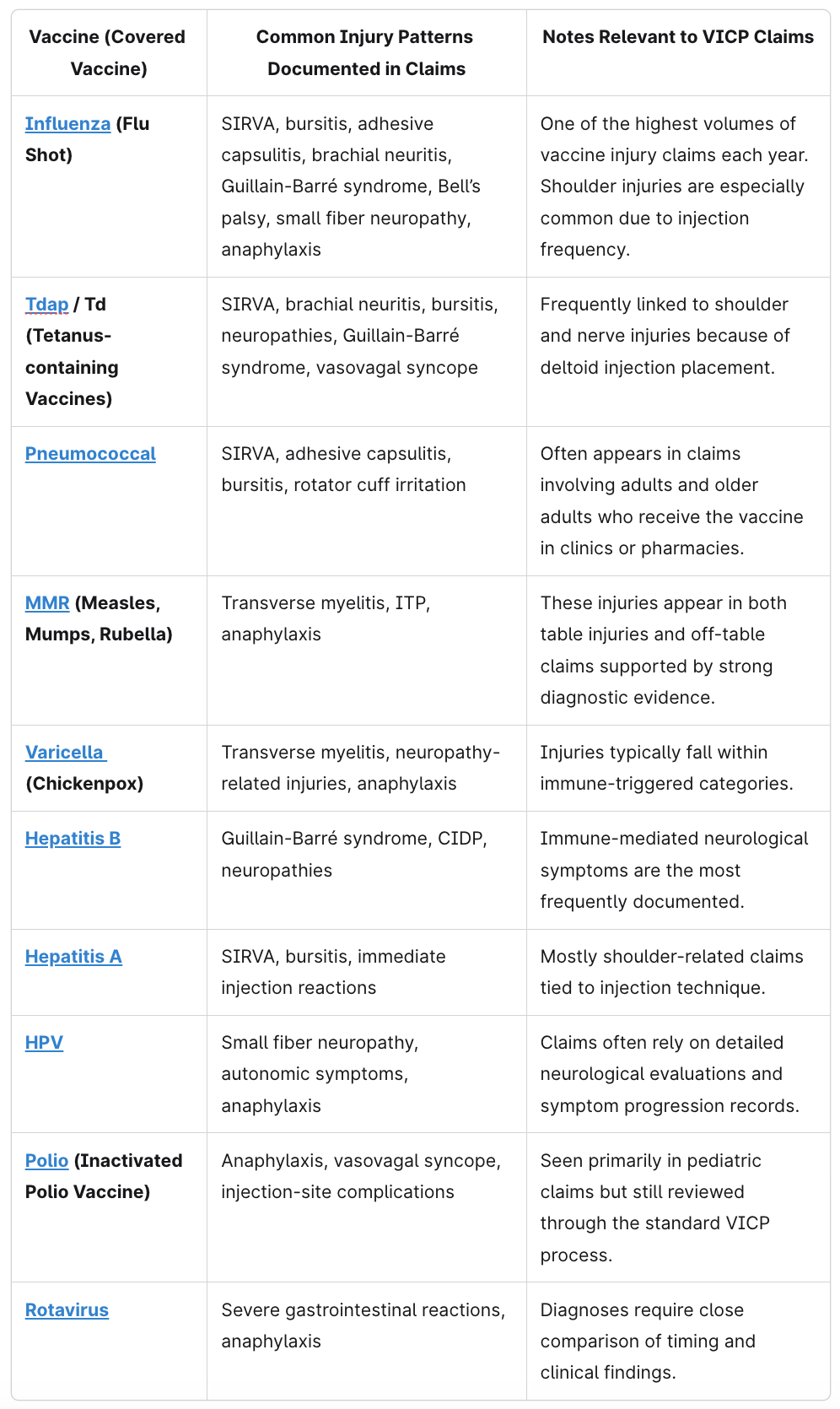5,000+
2,000+
5 Star
Covered Injuries in the VICP
Recognized Vaccine Injuries and Claim Eligibility
Vaccine injuries follow distinct medical patterns that appear in clinical records again and again. A large share starts with shoulder pain after a flu or Tdap shot when the needle enters the bursa or rotator cuff instead of the deltoid muscle. Others begin with numbness or tingling in the legs that progresses over days, a pattern seen in vaccine-related neuropathies and Guillain-Barré syndrome. Some injuries cause arm weakness that makes lifting objects difficult. Others trigger dizziness, syncope, or sharp nerve pain that radiates from the injection site. These changes matter because clinicians can map them against known vaccine injury presentations reviewed through the Vaccine Injury Compensation Program.
The timing of symptoms is one of the strongest indicators. Shoulder injuries often appear within forty-eight hours. Immune-related neurological conditions may develop within several days to six weeks. Sudden inflammatory reactions appear minutes to hours after vaccination. These timeframes are not random. They reflect mechanisms documented in thousands of vaccine injury claims filed in the United States Court of Federal Claims. When your symptoms match these patterns, the condition may qualify for review under national vaccine injury compensation standards.

Awards and Associations
One of more of our attorneys have been recognized for the following:

Hear Cheryl's Vaccine Injury Story
Cheryl, a former client of My Vaccine Lawyer, shares her experience with Shoulder Injury Related to Vaccine Administration (SIRVA) following a flu shot. She describes the sudden onset of pain, limited shoulder mobility, and a long recovery process that led her to seek legal help from attorney Max Muller.
With his support, Cheryl filed a successful claim through the Vaccine Injury Compensation Program and received a settlement covering her medical expenses, lost wages, and pain and suffering. SIRVA symptoms typically include sudden pain within 48 hours of vaccination, restricted range of motion, and discomfort that can last for weeks or months.
What Qualifies as a Vaccine Injury?
A vaccine injury is a condition that develops after vaccination and meets specific clinical criteria linked to injection trauma, immune activation or autonomic response. These criteria do not rely on guesswork. They rely on measurable findings such as limited range of motion, nerve conduction abnormalities, elevated inflammatory markers, sensory deficits, coordination changes or documented loss of strength. When these findings appear within a recognized biological window, they form the basis of a vaccine injury claim.
The Three Core Categories of Vaccine Injuries
Injection-Related Injuries (Most Common)
These injuries happen when the needle enters the wrong part of the shoulder or irritates nearby nerves. They produce symptoms like:
-
severe shoulder pain within forty-eight hours
-
inability to lift the arm above shoulder height
-
burning or pulling sensations in the upper arm
-
reduced range of motion documented by exam
-
persistent weakness or stiffness
Common diagnoses: SIRVA, bursitis, biceps tendonitis, adhesive capsulitis, brachial neuritis.
These account for the majority of VICP claims each year.
Immune-Mediated Injuries
These injuries develop when the immune system reacts intensely after a covered vaccine. Symptoms often escalate over several days.
Patterns include:
-
tingling in the feet or hands
-
ascending weakness
-
difficulty walking
-
impaired balance
-
facial weakness or drooping
-
abnormal reflex testing
Common diagnoses: Guillain-Barré syndrome, transverse myelitis, CIDP, neuropathy-related injuries.
These injuries often appear between 3 days and 6 weeks after vaccination.
Adverse Physiological Reactions
These involve acute systemic or autonomic responses. They present very differently from musculoskeletal or neurological conditions.
Symptoms can include:
-
sudden drop in blood pressure
-
fainting at or shortly after injection
-
rapid swelling or hives
-
difficulty breathing
-
chest tightness
Common diagnoses: anaphylaxis, vasovagal syncope, ITP.
These injuries typically occur within minutes to hours.
We are the Highest Rated Vaccine Injury Law Firm in the Country!
SEE OUR NOTABLE SETTLEMENTS
See some of our vaccine injury settlements in the VICP.
See Vaccine Settlements Here
MEET MAX
Max is a founding Partner of My Vaccine Lawyer and has been a Super Lawyer for 11 years straight.
Meet Max
MEET PAUL
Paul is a founding Partner at My Vaccine Lawyer and has been featured in the Washington Post and CBS News for his accomplishments.
Meet Paul
Why This Matters for a Claim
A vaccine injury is not defined by discomfort alone. It is defined by:
-
timing
-
symptom pattern
-
measurable medical findings
-
documented functional loss
-
alignment with known VICP injuries
These criteria determine whether a claimed injury is recognized under the Vaccine Injury Compensation Program and reviewed by the United States Court of Federal Claims.
Vaccine Injury Definition Table


How Vaccine Injuries Happen
Vaccine injuries develop through three primary mechanisms recognized by clinicians, medical literature and the Vaccine Injury Compensation Program. Each mechanism produces a predictable pattern, and those patterns become central evidence when filing a vaccine injury claim.
Injection Trauma to the Shoulder or Nerves
Improper needle placement is the most common cause of vaccine injuries. When the needle enters the bursa, joint capsule or rotator cuff instead of the deltoid muscle, the tissue reacts with intense inflammation. This leads to pain, stiffness and loss of mobility.
Common findings include:
-
limited range of motion
-
weakness when lifting objects
-
pain with overhead movement
-
swelling or warmth around the joint
-
radiating nerve pain into the arm or forearm
Diagnostic impressions often include SIRVA, subacromial bursitis, adhesive capsulitis, tendonitis and brachial neuritis. These injuries typically appear within 24 to 48 hours.
Immune-Triggered Neurological or Inflammatory Responses
Some injuries develop when the immune system activates intensely after a covered vaccine. This can affect the peripheral nerves, spinal cord or autonomic pathways.
Symptoms often begin subtly, then intensify:
-
tingling that spreads upward
-
leg weakness
-
difficulty walking
-
reduced reflexes
-
sensory loss
-
coordination problems
Conditions such as Guillain-Barré syndrome, transverse myelitis, CIDP and small-fiber neuropathy follow this mechanism. Many cases begin 3 to 42 days after vaccination, a timeframe repeatedly cited in VICP medical reviews.
Acute Physiological Reactions
Certain reactions occur quickly. These cases often involve autonomic or vascular responses that produce immediate symptoms.
Common patterns include:
-
fainting at the vaccination site
-
rapid heart rate
-
sudden drop in blood pressure
-
hives or swelling
-
airway tightness
Diagnoses frequently include anaphylaxis, vasovagal syncope and ITP. These injuries typically emerge within minutes to hours.
How Mechanisms Influence Claims
When petitioners file claims in the United States Court of Federal Claims, special masters review whether the medical mechanism aligns with recognized vaccine injury categories. A shoulder injury with rapid onset, a neurological condition that escalates over days or an acute reaction within minutes all correspond to patterns seen in thousands of VICP cases. These mechanisms form part of the foundation used to evaluate vaccine injury compensation.
Get a Free Consultation & See What Your Claim Is Worth
Have your case evaluated directly from one of our vaccine lawyers.
Recognized Vaccine Injuries
Clinicians and special masters consistently review certain injuries because they appear in large numbers of vaccine injury claims. These conditions follow predictable medical patterns, respond to diagnostic testing and often correlate with specific covered vaccines within the Vaccine Injury Compensation Program. The table below summarizes the injuries most frequently seen in VICP petitions. Each injury type can form the basis of a claim in the United States Court of Federal Claims when supported by clear medical evidence.
-
Recognized Vaccine Injuries Table

If your symptoms resemble any of these injury patterns, they may qualify for evaluation under the Vaccine Injury Compensation Program through a petition filed in the United States Court of Federal Claims.
-
Shoulder and Arm Symptoms After Vaccination
Symptoms affecting the shoulder are among the most frequently reported in vaccine injury claims. These symptoms often develop when the needle enters the bursa, joint capsule or rotator cuff instead of the intended muscle. People describe a sudden change in shoulder function that does not behave like routine post-injection soreness.
Common presentations include:
-
difficulty lifting the arm above shoulder height
-
sharp pain when reaching forward or behind the back
-
swelling around the joint
-
weakness when carrying objects
-
pain that increases with movement rather than improves
-
limited external rotation during physical exam
-
burning or pulling sensations that travel down the arm
These symptoms appear in conditions such as SIRVA, adhesive capsulitis, bursitis and brachial neuritis. They typically begin within forty-eight hours of vaccination, which helps clinicians establish an association with the injection.
-
-
Neurological Symptoms That Develop Days or Weeks Later
Neurological injuries progress differently. Symptoms often begin subtly and intensify over time, and they are documented in injuries such as Guillain-Barré syndrome, transverse myelitis, CIDP and vaccine-related neuropathies. These conditions may be identified through reflex testing, nerve conduction studies or MRI results.
Common neurological patterns include:
-
tingling in the feet or hands that spreads upward
-
leg weakness that affects balance
-
difficulty walking long distances
-
reduced or absent reflexes
-
numbness that moves to new areas
-
coordination problems during routine movements
-
changes in bladder control during spinal involvement
Onset for immune-triggered neurological injuries frequently appears between three and forty-two days after vaccination. This window is referenced in many vaccine injury claims and reflects recognized immune response timelines.
-
-
Immediate Systemic or Circulatory Symptoms
Some injuries present within minutes or hours. These reactions often involve the autonomic or vascular systems and can be documented through emergency records or immediate post-vaccination reports. Conditions such as anaphylaxis, vasovagal syncope and ITP appear in this category.
Common presentations include:
-
fainting shortly after receiving the vaccine
-
sudden drop in blood pressure
-
rapid heartbeat
-
hives, swelling or skin flushing
-
difficulty breathing
-
wheezing
-
unexplained bruising
-
nosebleeds
-
pinpoint red spots on the skin
-
bleeding that takes longer to stop
These symptoms help clinicians distinguish between an acute physiological reaction and delayed-onset neurological or shoulder injuries. We need this distinction to help push your claim forward.
-
-
Vaccines That Are Most Often Linked to Injuries
Covered vaccines appear repeatedly in vaccine injury claims filed through the Vaccine Injury Compensation Program. Certain vaccines produce identifiable injury patterns because of injection technique, immune response or circulatory reactions. These associations appear in the evidence presented to the United States Court of Federal Claims when petitioners file claims supported by medical records, symptom timelines and diagnostic results. The table below outlines the vaccines most frequently connected to recognized vaccine injuries.

Why You Need a Vaccine Injury Lawyer
Vaccine injury claims move through the United States Court of Federal Claims, and the evidence must follow specific medical and legal standards. A vaccine injury lawyer understands how to show that your symptoms match recognized injury patterns, how to present medical records in the format required by the Vaccine Injury Compensation Program and how to support the claim with detailed documentation that strengthens the petition. These claims rely on precise timelines, diagnostic findings and expert review. A lawyer familiar with this system can organise the facts, coordinate evaluations and prepare the evidence in the way special masters expect to see it.
Experience with vaccine injury cases also helps identify missing pieces in the record. This includes gaps in treatment notes, imaging that may support the claimed injury or specialist assessments that clarify the diagnosis. These steps influence how compensation is reviewed for medical costs, lost earnings and long-term effects. A focused approach gives the claim a clear structure built on the strongest available evidence.
1. Contact Your Doctor
If you suffered a vaccine-related injury, adverse effects or worsening symptoms, call your doctor immediately.
When a Vaccine Injury Becomes a Legal Claim
A vaccine injury becomes a viable legal claim when the medical records, symptom timeline and diagnostic findings support patterns recognized by the Vaccine Injury Compensation Program. Special masters in the United States Court of Federal Claims review specific criteria to determine whether an injury is likely linked to vaccination. The checklist below reflects the key elements that appear consistently in compensated vaccine injury claims.
-
Symptoms began after vaccination, not before
The onset must follow the vaccination. Records that show a clear symptom-free baseline strengthen the claim.
-
Symptom timing matches recognized injury windows
Shoulder injuries often begin within forty-eight hours. Immune-mediated neurological conditions appear between three and forty-two days. Acute reactions develop within minutes to hours.
-
Symptoms follow a recognized vaccine injury pattern
Patterns documented across SIRVA, GBS, transverse myelitis, CIDP, neuropathies and anaphylaxis carry significant weight.
-
Medical records document measurable changes
Examples include reduced range of motion, weakness on exam, sensory deficits, abnormal reflexes, nerve conduction findings or MRI results.
-
A clinician recorded the injury soon after symptoms began
Early documentation provides a clear timeline for the petition.
-
The injury caused functional limitations
Difficulty lifting, walking, grasping objects, performing daily tasks or working helps demonstrate impact.
-
No more likely alternative explanation appears in the records
If the medical notes support vaccination as the most plausible cause, the claim becomes stronger.
-
The vaccine is a covered vaccine under the VICP
Influenza, Tdap/Td, MMR, Varicella, Hepatitis A/B, Pneumococcal, HPV and other covered vaccines qualify for review.
-
The medical mechanism aligns with recognized patterns
Injection trauma, immune activation or acute physiological response reflect mechanisms found in compensated claims.
-
The claimed injury is consistent over time
Progression documented across primary care, orthopaedic, neurology or emergency notes reinforces validity.
Recent Blogs
How Long Do Flu Shot Side Effects Last?
Paul Brazil: Jan 22, 2026
What is the NCVIA?
Paul Brazil: Nov 10, 2025
Frozen Shoulder After Vaccine
Max Muller: Nov 5, 2025